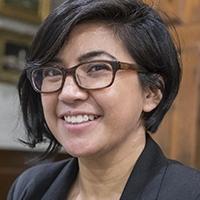
Genevieve Clutario
Associate Professor of American Studies
Links
Specializes in gender and Filipinx history, Asian American Studies, history of U.S. empire, and transnational feminist approaches to the study of beauty and fashion
Genevieve Clutario is the author of Beauty Regimes: A History of Power and Modern Empire in the Philippines,1898 - 1941 (Duke University Press, March 2023) and is the recipient of the Duke University Press Scholars of Color First Book Award and the Weatherhead East Asian Institute at Columbia University First Book Award. She published, “Pageant Politics: Tensions of Power, Empire, and Nationalism in Manila Carnival Queen Contests,” in the anthology, Gendering the Trans-Pacific World (Brill Press, 2017) and “World War II and the Promise of Normalcy: Filipina Lives Under Two Empires” in Beyond the Edge of the Nation: Transimperial Histories with a U.S. Angle (Duke University Press 2020). She co-edited with Rana Jaleel a special issue of the Amerasia Journal, entitled Rethinking Gendered Citizenship. Intimacy, Sovereignty, and Empire. Before arriving at Wellesley, Clutario was an assistant professor in History and History and Literature at Harvard University. Her new research project, Power and Allure: Gender, Authoritarianism, and the Promise of Development, focuses on a history of feminized power (beauty, celebrity, allure, and charisma) in the Philippines under authoritarian regimes of the Cold War, international development projects, U.S. imperialism, and the making of the global south. She continues to pursue research and teaching interests focused on Asian American narratives in global perspectives; comparative histories of culture and modern empire; transnational feminisms; and gender, race, and the politics of fashion and beauty.
Current and upcoming courses
This course examines historical and contemporary contexts and processes of defining Asian/American beauty as well as the ways in which beauty is used to manage bodies, define social hierarchies, and gain or maintain power. Moreover, this course asks how presentations of beauty, especially “beautiful bodies,” could also be used as forms of subversion and resistance. Looking at sites such beauty pageants, cosmetic consumer cultures, drag performances, cosmetic surgery, and the transnational production and consumption of beauty influencers we will investigate how race, gender, sexuality, and class informs definitions of beauty and how definitions of beauty inform constructions of race, gender, sexuality, and class.
-
This course offers an introduction to the history of Asian American labor and immigration from the mid-nineteenth century to the present. Using a range of interdisciplinary frameworks and sources, the course will focus on the flow and movement of people to the United States, we will nonetheless pay special attention to the global, transnational and transpacific networks, issues, events and moments that have historically impacted the movement of peoples around the world. This course also spotlights the ways in which labor played a central role in shaping these migratory flows and experiences. As much as possible, this course will aim to look at historical events and moments from the perspective of ordinary people, or “histories from below,” in order to understand how historical narratives may change when you are not looking at histories from the perspective of those in power.